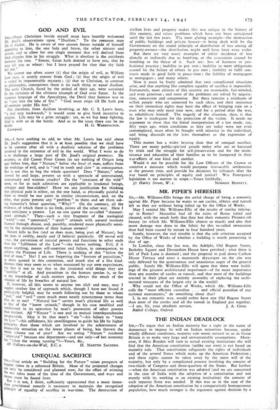Stet,—I have nothing to add, to what Mr. Lewis has
said about Dr. Joad's suggestion that it is at least. possible, that we shall have to be content after all with a dualistic solution of the problems involved in the existence of evil in the world. What I want to do is to challenge a large part of Dr. Joad's original premises. He assumes, as did Canon Peter Green (to say nothing of Origen long ago) before him, that " Nature," below the level of man, suffers from the workings of evil, and is " red in tooth and claw " in consequence. But is not this to beg the whole question? Does " Nature," when viewed by and large, present us with a spectacle of unrestrained, unnecessary and wanton cruelty? Do the " creatures of the wild " seem, so far as such adjectives are applicable to irrational beings, unhappy and fear-ridden? Have we any justification for thinking that physical pain is either, on the one hand, as physically painful to them as would be our pains in similar circumstances, and, on the other, that pains present any " problem " to them and set them ask- ing humanity's bitter question, "Why? " On the contrary, all the evidence, of which there is no little, points all the other way. Here I must anticipate a protest. Let no one quote the so-called " domesti- cated animals." They—such a tiny fragment of the zoological "world "—are " unnatural," "spoilt " animals with natural instincts blunted through disuse, and, possibly, rendered more physically sensi- live by the ministrations of their human owners!
Nature kills to live (and so does man, being part of Nature), but she does it swiftly, neatly and (I believe) painlessly. Of moral evil —i.e., the perversion of natural powers and functions to other ends than the "fulfilment of the Law "—she knows nothing. Evil, if it means anything, means self-assertion and failure, in consequence, to achieve the Purpose of Life. There is nothing of this " below the level of man." No! I am not forgetting the "horrors of parasitism," so often quoted in this connexion, and much else of a like kind. Horrors they may seem to us when measured by our own experiences, but that is not to say that to the irrational wild things they are "horrible" at all. And parasitism in the human species is, so far as my knowledge of such matters goes, always the result of the vitiation of life by breaches of natural law.
If, however, all this seems to anyone too slick and easy, may I suggest another line of approach which, though I have not found it Particularly helpful, may be worth following out by those to whom pain" and " evil" seem much more nearly synonymous terms than they do to me? " Natural law " covers man's physical life as well as that of the "lower animals," though in his case modified and Conditioned in its operation by man's possession of other powers than instinct. All "Nature " is one and its mutual interdependencies innumerable. May it be that man's " sin "—his failure to " keep the Law "—his selfishness, his unwillingness to guide his life by higher Principles than those which are involved in the achievement of Pleasurable sensation on the lower planes of being, has thrown the !hole scheme out of gear? Are we seeing "Nature " rendered unnatural" because one department—and one only—of her economy has "taken the wrong turning "?—Yours, &c.,






























 Previous page
Previous page